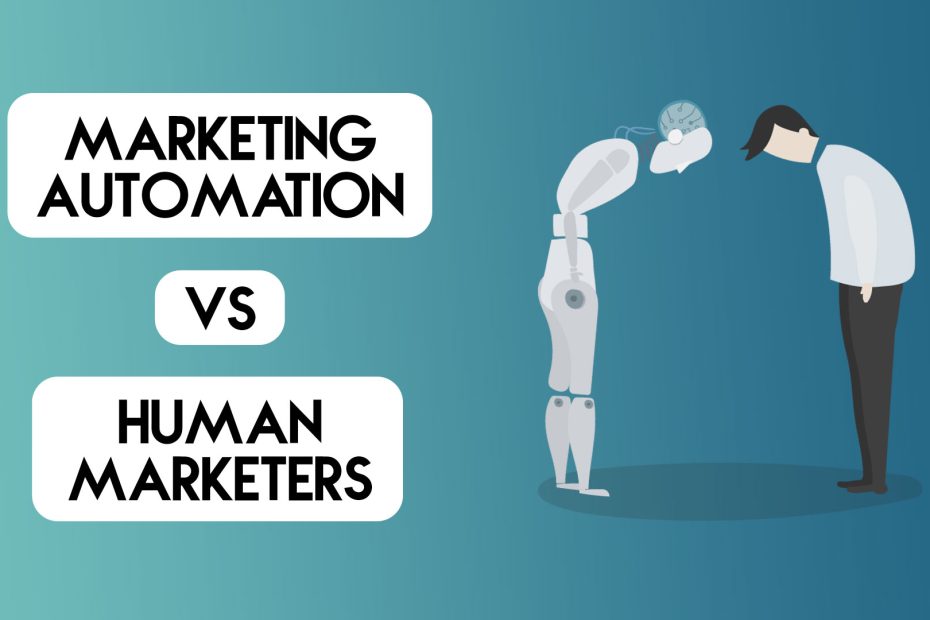There is a huge debate between Marketing Automation and Human Marketers. Marketing automation has evolved into a powerful tool for streamlining and improving many aspects of marketing campaigns. From email marketing to lead nurturing, automated technology has revolutionized the way businesses engage with their audiences. However, the rise of marketing automation has also raised concerns about the complete replacement of human marketers. This article will address the following questions:
The Benefits of Marketing Automation
Improved Efficiency and Productivity
Marketing automation enables repetitive tasks to be automated, freeing up time for marketers to focus on strategic activities.
With automated workflows, marketers can streamline processes, reduce manual errors, and achieve higher efficiency.
Automation tools allow for personalized and targeted communication, leading to increased engagement and conversion rates.
Enhanced Lead Nurturing and Customer Relationship Management
Marketing automation platforms provide valuable insights into customer behavior, allowing marketers to nurture leads effectively.
Automated lead scoring and segmentation help marketers identify high-value prospects and tailor their messaging accordingly.
By delivering personalized content at the right time, automation can improve customer satisfaction and retention.
Data-Driven Decision Making
Marketing automation generates detailed analytics and reporting, offering marketers valuable insights into campaign performance.
With access to real-time data, marketers can make data-driven decisions, optimize campaigns, and adapt strategies on the fly.
Automation tools enable A/B testing, allowing marketers to experiment and refine their approaches for better results.
The Limitations of Marketing Automation
i. Lack of Human Touch
While automation provides efficiency, it may lack the human touch necessary for building authentic and meaningful connections with customers.
Marketers should strike a balance between automated messaging and personalized interactions to maintain a genuine customer experience.
ii. Complexity and Learning Curve
Implementing marketing automation requires technical expertise and a learning curve for marketers.
Keeping up with evolving technologies and integrating multiple systems can pose challenges for organizations.
iii. Incomplete Customer Journey View
Marketing automation primarily focuses on digital touchpoints, which may result in an incomplete view of the customer journey.
Marketers must consider offline interactions and other non-digital touchpoints to fully understand customer behavior and preferences.
Marketing Automation vs Human Marketers
Marketing automation vs human marketers play distinct roles in the field of marketing. While both have their advantages and limitations, understanding their differences can help businesses make informed decisions about their marketing strategies.
Marketing automation refers to the use of software and technology to automate repetitive marketing tasks and streamline processes. It involves leveraging tools like email marketing software, customer relationship management (CRM) systems, and analytics platforms to execute targeted campaigns, nurture leads, and track performance. Automation can save time, increase efficiency, and enable personalized communication at scale.
On the other hand, human marketers bring a unique set of skills and qualities to the table. They possess the ability to think critically, adapt to changing trends, and create engaging content that resonates with the target audience. Human marketers can develop comprehensive strategies, provide creative insights, and build meaningful relationships with customers through personalized interactions.
The choice between marketing automation and human marketers depends on various factors. Marketing automation is highly efficient for repetitive tasks like sending automated emails, managing social media posts, or analyzing data. It can handle large volumes of data and deliver consistent messaging. However, it may lack the personal touch and emotional intelligence that human marketers can provide.
Human marketers, on the other hand, excel in areas that require creativity, intuition, and strategic decision-making. They understand nuances, identify emerging trends, and adapt marketing efforts accordingly. Human marketers can build rapport with customers, offer personalized experiences, and provide genuine interactions that create lasting brand loyalty.
In practice, a blend of marketing automation and human marketers often yields the best results. By leveraging automation tools for routine tasks, human marketers can focus on high-value activities such as crafting compelling content, developing innovative campaigns, and engaging with customers on a deeper level.
Ultimately, the choice between marketing automation and human marketers should be based on the specific goals, resources, and target audience of a business. By striking the right balance between automation and human expertise, companies can create effective marketing strategies that drive growth, build brand affinity, and deliver exceptional customer experiences.
Importance of human touch in marketing automation
While marketing automation has revolutionized the way businesses engage with customers, it is important to recognize the value of the human touch in the marketing process. Incorporating a human element into marketing automation strategies can enhance customer experiences and drive meaningful connections. Here’s why the human touch is crucial in marketing automation.
Emotional connection:
Marketing automation platforms are efficient at delivering messages, but they often lack the ability to evoke emotions. Human marketers can inject empathy, humor, and authenticity into communications, making customers feel understood and valued. Emotional connections foster trust, loyalty, and long-term relationships.
Personalization:
Automated systems can segment audiences and deliver targeted messages, but they may struggle to create truly personalized experiences. Human marketers can go beyond demographics and tailor content based on individual preferences, behaviors, and interests. This personal touch increases engagement and generates higher conversion rates.
Creative thinking:
Marketing automation is great for executing predefined tasks, but it may not be adept at creative problem-solving or innovative campaigns. Human marketers bring unique perspectives, creativity, and intuition to the table. They can devise out-of-the-box strategies and adapt marketing efforts based on real-time feedback.
Adaptability:
Automated systems rely on predefined rules and algorithms, which may not always account for rapidly changing market dynamics. Human marketers possess the agility to respond to evolving trends, customer needs, and competitive landscapes. They can quickly adjust marketing strategies, seize opportunities, and navigate challenges.
Relationship building:
Building strong relationships with customers is crucial for long-term success. While automation can handle routine interactions, human marketers excel in nurturing relationships through personalized interactions. They can engage in meaningful conversations, address concerns, and offer tailored solutions, creating a sense of connection and brand loyalty.
Trust and authenticity:
Customers value authenticity and transparency. Human marketers can bring genuine voices to marketing communications, establishing trust and credibility. They can infuse storytelling, personal anecdotes, and real experiences into brand messaging, making it relatable and resonant with customers.
By infusing the human touch into marketing automation, businesses can elevate their customer experiences, differentiate themselves from competitors, and foster lasting relationships. The synergy between automation and human expertise allows for efficient execution, while maintaining the emotional intelligence, creativity, and adaptability that only humans can provide. Striking the right balance ensures a holistic approach that delivers impactful marketing campaigns and drives business growth.
Are you tired of spending countless hours manually managing your marketing campaigns? Ready to take your business to the next level with the power of automation? Look no further! We are thrilled to invite you to our highly anticipated “Free Workshop of Marketing Automation” Join us get acquainted with the latest knowhow on Marketing Automation as we unravel the secrets of streamlining your marketing processes, boosting your conversions, and maximizing your ROI. Don’t miss out on this incredible opportunity to revolutionize your business. Register now and unlock the potential of automation for FREE!
Register for our FREE WORKSHOP.
FAQs about Marketing Automation VS Human Marketers
Q. Is marketing automation replacing marketers entirely?
A. No, marketing automation is not replacing marketers entirely. While automation tools improve efficiency and streamline processes, human expertise is still crucial for strategy development, creativity, and relationship building.
Q. Can marketing automation eliminate the need for human marketers?
A. Marketing automation cannot eliminate the need for human marketers. Automation complements their work by automating repetitive tasks and providing data insights, allowing marketers to focus on strategic activities and customer-centric approaches.
Q. How marketing automation affects marketers?
Marketing automation has transformed customer engagement, but the human touch remains crucial. Integrating human elements enhances experiences, evokes emotions, and builds trust. Human marketers excel in personalization, creativity, adaptability, relationship building, and authenticity. Striking the right balance between automation and human expertise elevates experiences, differentiates businesses, and fosters lasting relationships.
Conclusion
In the race between Marketing Automation vs Human Marketers, marketing automation has significantly transformed the role of marketers, but it has not replaced them entirely. The benefits of automation, such as improved efficiency, enhanced lead nurturing, and data-driven decision making, are undeniable. However, marketers bring a human touch, creativity, and strategic thinking that automation tools alone cannot replicate. By harnessing the power of automation while embracing their unique skills, marketers can leverage technology to drive impactful marketing campaigns and deliver exceptional customer experiences. The relationship between marketing automation and marketers will continue to evolve, shaping the future of marketing in an increasingly digital landscape.





